Tánaiste Faces Duelling Realities on Israel–Palestine Visit

Foreign policy begins at home, or so a saying that is often used about the United States goes.
Whether we like it or not, the West – and much of the rest of the world – still looks to America to set the global agenda.
But when a US president travels abroad, there are usually domestic considerations at play. And, in a country so polarised, it can be hard for them to please everyone at home and abroad.
Ireland’s politicians rarely face these duelling realities.
It is not that Irish people do not care about foreign policy – there is a reason that we refer to ourselves as an outward-looking nation.
Instead, it’s because everyone usually is on the same page, our politicians included.
In several important ways, the Israel-Palestine conflict is an exception.
And that made Tánaiste Micheál Martin’s visit to the region particularly tricky.
Ireland is already one of Palestine’s most-stalwart champions in the European Union – ahead of Luxembourg and Belgium, who are also active on the conflict.
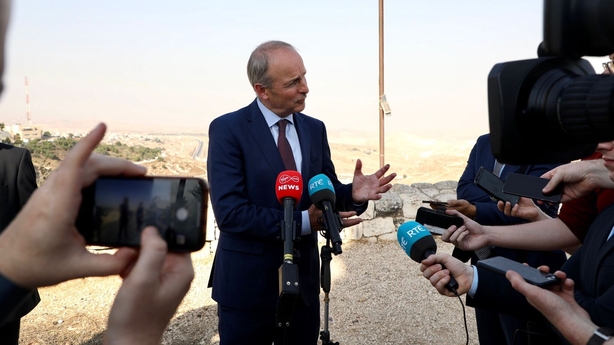
While Ireland’s efforts largely focus on pushing existing common EU positions, the consequence is that it’s viewed by the Israelis as one of the most anti-Israel countries in the West.
Speaking in Jerusalem, the Tánaiste did not dissent from this diagnosis.
Rather, he told RTÉ News that one of his aims on the trip was to counter this view, saying that it was “important to explain that Ireland is not anti-Israel as a country”.
“The Irish position is basically through the lens and the prism of international law and what we feel is fair and just and right,” Mr Martin said, noting that Ireland believed in a two-state solution.
“So, therefore, we are very clear that we criticise policies that, in our view, undermine the prospect of a two-state solution. And that’s not being anti-Israel – it’s just calling it as we see it.”
But many activists believe that Ireland should have an even more muscular posture towards Israel.
“The European Union line, remains, broadly speaking, in support of Israel and Israel’s position,” Brendan Browne, an assistant professor in conflict resolution at TCD, told RTÉ News.
“And, unfortunately, that is not in step with the vast majority of Irish academics who are working on this region or activists in the struggle.”
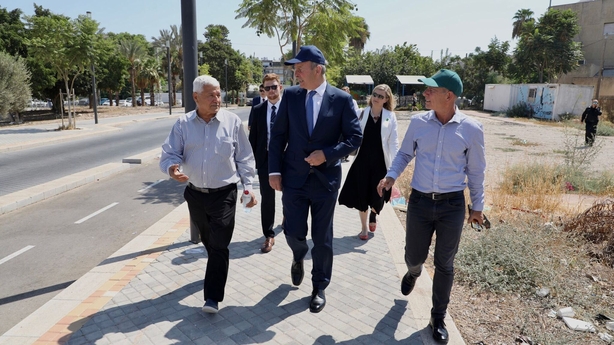
Dr Browne said that, unless Ireland took steps to “ostracise” Israel, then nothing would change.
“Unless there are meaningful calls to platform the conversation around sanctions and a boycott of the Israeli state, then everything that Micheál Martin says is a waste of time,” he said.
Merely mentioning a boycott of Israel would make Ireland a true outlier within the European Union.
Instead, the Government is approaching the situation with an evolving pragmatism, even as the Israel–Palestine conflict deepens.
Last December, prime minister Benjamin Netanyahu came back to power at the helm of the most far-right and ultranationalist government in Israeli history.
Mr Netanyahu’s government still officially supports the two-state solution, which would establish a Palestinian state alongside Israel. But it is only officially.
Bezalel Smotrich, the country’s finance minister, and Itamar Ben-Gvir, the national security minister, both believe that Israel should annex the West Bank, which has already been under Israeli military occupation since 1967.
That would extinguish any hope of Palestinian statehood.
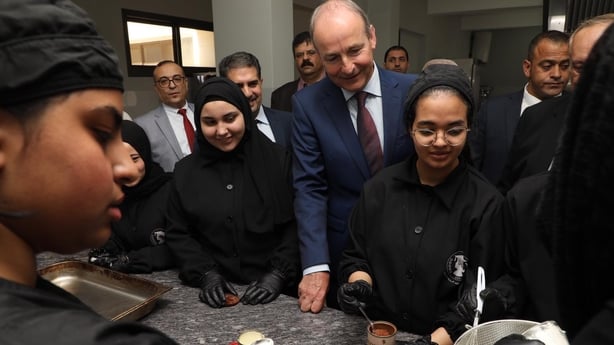
Their influence reflects the growing role played in Israeli society by religious ultranationalists, who now represent the third-largest faction in parliament.
In the past year, there has been a rapid increase in Jewish settlements in the West Bank – settlements that Ireland, like most countries, considers unlawful.
Some 400,000 Israelis now live in the West Bank, alongside around 2.6 million Palestinians. Violence between both groups has, unsurprisingly, grown.
At the same time, Israel has also conducted military raids on the West Bank with increasing frequency, leaving a trail of death and destruction in their wake.
It is therefore becoming more difficult for a country like Ireland to carry a mantle of moral authority while still maintaining relations with Israel.
And it has become more difficult to see how the two-state solution could be realised.
On Tuesday, the Tánaiste had what he described as a “frank and open” conversation with foreign minister Eli Cohen, a politician from Mr Netanyahu’s more moderate Likud party.
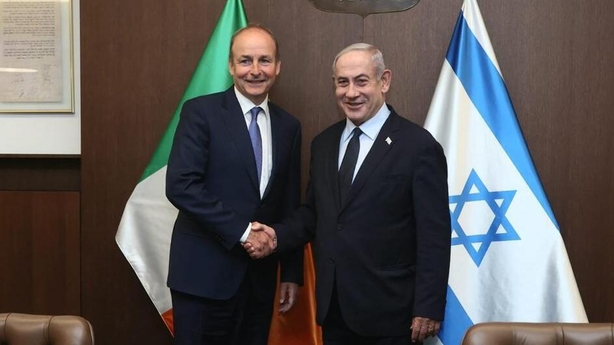
He repeated Ireland’s criticism of the expansion of the Jewish settlements and said that the continued encroachment into the West Bank threatened the viability of the two-state solution.
Later, he had a “cordial” conversation with Mr Netanyahu alongside Ron Dermer, the minister of strategic affairs.
The Tánaiste had begun his day at Yad Vashem, the World Holocaust Remembrance centre. Though such a visit is customary for visiting leaders, it allowed him to press Ireland’s commitment to tackling anti-Semitism.
And though he later told the travelling Irish media that he had got no sense that the Israeli government believed Ireland was anti-Semitic, that view isn’t uncommon in Israel.
The reception at the Israel Council on Foreign Relations, where Mr Martin delivered a speech, was also cordial. But it was far from warm.
The Tánaiste said that Ireland spoke out about the conflict not because of hostility to Israel, but because Ireland, as a small, militarily neutral country, valued the international rules-based order.
“Our security – indeed, our very existence as a sovereign state – relies on the compliance by all nations, however large or however powerful, with international law,” Mr Martin said.
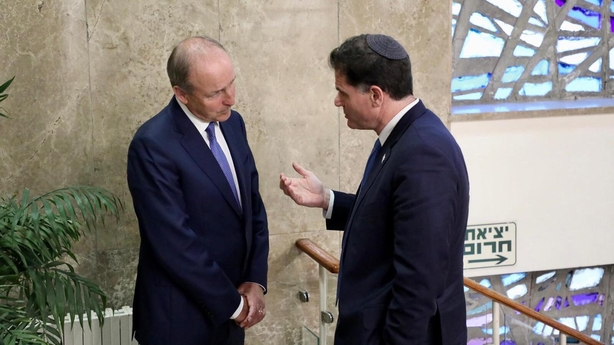
He did not dare mention the more obvious explanation for Ireland’s solidarity: its experience as a British colony.
But, at several points during the visit, the Tánaiste was more willing to draw on the lessons of the Irish peace process, offering it as a template of sorts for solving the internecine squabble in the Middle East.
On Wednesday, the Tánaiste was greeted like a rock star in the West Bank.
As he went from classroom to classroom at a school in Ramallah part-funded by Ireland, Mahmoud Mosa Abu Mouis, the Acting Minister for Education of the Palestinian Authority, told students that Ireland was a friend of Palestine – that it had been good to Palestine.
The reception at the Muqata’a presidential compound was equally warm. After all, Mr Martin and Mahmoud Abbas, the President of the Palestinian Authority, first met in 2008.
Though Ireland has thus far rejected Mr Abbas’ request to formally recognise the Palestinian state, the Tánaiste said that the President was “complimentary” of Ireland’s position – which is to wait until there is broader consensus in the EU before making such a move.
The reality, however, is that the 87-year-old Mr Abbas is seen by many in Palestine as yesterday’s man – a relic who has ceded much of the West Bank to militant groups.
Younger Palestinians, in particular, have lost faith in his efforts to end the conflict with negotiations and diplomacy.
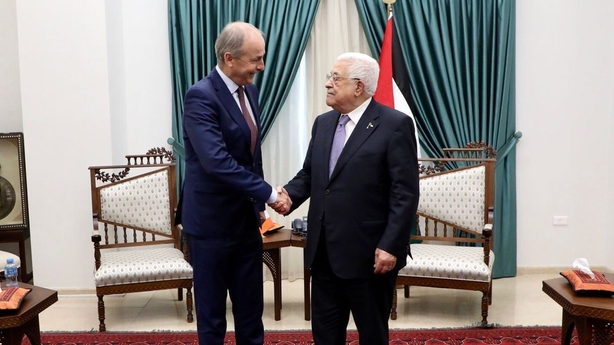
Increasingly, they believe that Israel should be opposed by force.
And because elections have not been held in Palestinian territory since 2006, many of them have not ever had the chance to vote.
The Palestinian Authority, seen as a corrupt body and discredited as a facilitator of Israel’s occupation, has thus lost its mandate – in every sense of the term.
Alive to these crosscurrents, the Tánaiste told Mr Abbas that it was imperative that elections be held – and that the authority needed to implement reforms.
“You’ve got the Irish Government trying to be seen to be friends with the Palestinian Authority and friends with the Israelis,” said Dr Browne.
“But for many of us who are involved in activist, on-the-ground struggle, they’re one and the same, because the Palestinian Authority is responsible for imposing the security apparatus.”
That makes finding a solution to a seemingly irresolvable conflict all the more difficult.
And though he radiated knowledge and spoke with precision in the Middle East, by reiterating Ireland’s long-standing positions, the Tánaiste therefore disappointed those on both sides of the conflict.
Source : RTE





